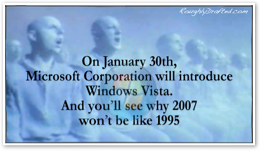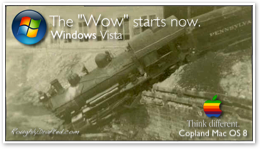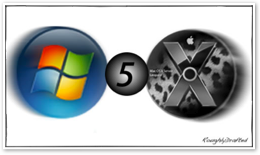


Apple’s announcement that finishing the iPhone would come at the cost of a delayed release of Mac OS X Leopard set off a flurry of bizarre responses from Apple detractors always on the lookout for ways to bulldoze the company's mountains into minor molehills.
The previous article asked: Has Leopard fallen into a Copland-Vista Conundrum? This one examines the idea: Will Leopard miss a magical window of opportunity left open by Vista?
Reader Schininis observed: “I think Apple has the luxury of being in the drivers seat right now with the timing of their operating system delivery. It seems obvious to me now that the delay decision was helped along by Vista's total lack of WOW.
“If Apple had to react to Vista, they probably would have moved things along. But, why deliver Leopard now, when there is no pressure to react to Vista?
“Vista, all on its own, is weak. Apple can afford to let Vista be weak a few more months while they sneak in even more features than they thought they could. This way as we head into the important back-to-school and Christmas seasons, Apple will be able to make Vista look like an over ripe banana... mushy with a bad smell.”
Consider the impact Vista has had after being thrown into the bleak, six year chasm stretching from Windows XP. Rather than serving up fat sales to desperate customers, Microsoft has been left to stretch the truth to suggest that Vista sales are not in really in the toilet.
Reader Andrew Sheridan sent a link to a Blackfriars’ Marketing article by Carl Howe, who pointed out how Microsoft is juicing its revenues: “Microsoft achieved record breaking earnings during the Vista launch quarter by taking money out of its assets, not through amazing sales of Vista and Office.”
“As a point in contrast,” Howe wrote, “Apple Inc. has been launching a lot of products over the last nine months and has added almost $2 billion to its balance sheet and assets in the same period that Microsoft's assets dropped $6 billion.”
On top of weak sales, factor in the interrelated, peripheral problems Microsoft is dealing with as it ties its future success to the languishing Windows Vista:
-
•poor strategic direction
-
•dependance upon a faltering monopoly position
-
•reliance upon the media to cover up reality
-
•a failing business plan
Here’s how those factors relate to Microsoft, and how they have played out for other companies in the past.
Poor strategic direction: Microsoft won’t be the first corporation to fail spectacularly. There are many long lists of companies and organizations that lost their influence and position by executing a series of poorly timed blunders. A recent example is Quark.
Back in September of 2005, the article Is Microsoft Vista the new Quark? compared the fate of Windows Vista to Quark Xpress in a historical overview of the protracted efforts by Quark and Microsoft to deliver the next generation of their software products.
Despite being firmly entrenched among graphic design users, Quark made a series of poorly timed mistakes that cost the company customers, credibility, and leadership within its industry.
Quark had bet against Apple's prospects for Mac OS X, delivering a Classic-only release just as Jaguar 10.2 was setting a new direction for Mac users. Quark then insulted its customers with two half-capacity, full price upgrades which featured more innovation in DRM copy protection than in actual usability.
To inflame the already problematic situation, Quark also decided to delegate both its development and customer support overseas.
50 Ways To Leave Your Vendor.
Irate customers were left talking to third rate call centers that coolly explained without using any words that Quark was a cheap company hoping to make fat profits off its loyal customers by shortchanging them in every way possible. This is not a good strategy for retaining customers.
Quark’s customers didn’t all immediately leave. Just as PC users in 2002 with a lot invested in Windows software were commonly unable to jump ship to Linux or Power Macs, Quark's customers in 2002 were in many cases also forced to just hold their nose and pay Quark for the weak updates that were delivered years late.
Dependance upon a faltering monopoly position: For many years, Quark enjoyed a near monopoly position in desktop publishing software--aided in part by the sub-industry of third party Quark eXtensions.
It rather arrogantly took advantage of its own customers using that monopoly leverage. The problem for Quark was that its distant rival Adobe was delivering a new competitor into the ring: InDesign.
In particular, Adobe capitalized on Quark's weak position with Mac OS X. The timing couldn't have been worse for Quark; its users were not just tempted to jump ship but were actually pushed overboard by Quark’s poor strategic direction just as Adobe was floating out its InDesign lifeboats.
Having a monopoly position allowed Quark to abuse its customers for a while, but it didn’t last long. Companies that don’t take care of their customers end up old and alone. Monopoly power appears to be a strength, but it really becomes a weakness because it offers a luxurious world that cultivates poor strategic direction.
The Luxurious World of Monopolies.
The core problem with monopolies is that, while they offer the illusion of a unilateral control, they also create vacuums of innovation. When an industry leader sits back to comfortably enjoy its wealth on the backs of its customers, it stops serving their needs and fresh upstarts are given the opportunity to steal away that business.
In 2000, Microsoft began relaxing to enjoy its monopoly position crafted during the 90s; during that previous decade, Bill Gates' blustering created the impression for the media that Microsoft was the standards bearer of all technology and the pace setter of all trends in the tech world.
From that powerful position, Microsoft had the luxury of idly coasting on its users for years. Microsoft certainly isn't the first company to do something like this; coasting is actually the default behavior for all companies that hit their stride without knowing what to do next.
Reliance upon the media to cover up reality: The weakness of power not only cultivates poor strategic direction, but also tends to focus attention on covering up mistakes in the media rather than solving the actual problems. This just makes things worse, particularly when that subterfuge is later exposed.
Interestingly, part of the downfall of monopolies comes from the delayed discipline of reality checks offered by the media, which tends to cheer on the gratuitous sloth of former glories long after any celebration is deserved.
The Delay of Media Momentum.
Counter-intuitively, the media is just not very good at pointing out that the emperor has no clothes; once enough children point it out for them however, the embarrassment becomes a great story and the press begins beating up the same celebrated darlings they once revered as untouchable.
Apple's fall from grace in the mid 90s provides a great example. Few mainstream media outlets actually pointed out that the meek Mac System 7 and the slow trickle of minor updates that followed it in the early 90s were not the best Apple could have delivered.
The media simply didn’t understand the details in play. It wasn't until things were obviously out of control around 1995 that the press turned from its near worship of Apple to constant ridicule of the now beleaguered company. 

The Media Slackline.
In reality, Apple had begun making serious mistakes in the late 80s under the direction of John Sculley and Jean Louis Gassée. It wasn’t until a half decade later that those errors had compounded into results that the media could recognize.
Conversely, even after a revitalized Apple turned things around, it still faced years of scorn from naysayers still stuck in the habit of repeating criticisms of Apple they assumed to be popular, fashionable, and safe to repeat ad nauseam.
Only in the last couple years has it become common to hear from writers with the intellectual honesty and capacity to understand that circumstances have changed in the tech industry.
Technical ignorance among reporters exaggerates the delayed media momentum and results in ‘conventional wisdom’ trailing reality, in some cases by many years.
The beleaguerment of Apple was rooted in the late 80s, but only reached full tilt media coverage as the problems were beginning to be solved; delayed criticisms are still occasionally heaped on the company years after it has established strong leadership and proficiency across its operations.
That same delayed media momentum is just now detecting the blood left in the water by the thrashing Microsoft, which has been hemorrhaging billions in its failed consumer electronics initiatives for years, and faces increased pressure from the competition that threatens its OEM monopolies and their automatic revenue streams.
Rather than working to solve its core problems, Microsoft’s executives have been feeding the media false information at regular intervals to distract from reality:
-
•misleading sales reports
-
•unrealistic sales estimates
-
•fearful uncertainty about Linux
-
•assaults on the yet unreleased iPhone
Since Microsoft has no real answers and can’t execute its own plans, it has to resort to seeding the media with talking points that create the illusion that everything is well: revenues are up again, Xbox units are selling, Linux is still scary, the iPhone won’t in any possible scenario meet the needs of customers.
Microsoft’s real problems have long been contained by an uncritical media parroting the press releases they are fed; that’s beginning to change however as the crisis signs become increasingly difficult to ignore.
The real problems plaguing the disappointing launch of Vista didn't originate earlier this year when Microsoft pushed it out, but were rooted way back into the 90s.
Microsoft faced impossible challenges in solving the security and architectural problems it had accumulated during the development of NT, problems that were well known to everyone who didn't get their information from industry writers repeating the same tired set of “known” stories.
Failing business plan: In addition to the technical problems growing within Windows development, Microsoft also faced the cancer eating at its basic business plan: the absurd idea that third party PC makers were going to happily work to make Microsoft rich forever was not only uncritically repeated by the press, but also used as an attack against the beleaguered Apple.
The media insisted that Apple was dying, not because it had failed to deliver products users wanted and needed, but because Apple wasn't copying Microsoft. In their simple world, the obvious answer to fixing Apple was for it to emulate Microsoft, which was making billions of dollars just cranking out the software sold by OEM PC makers.
There were warning signs that disputed this conventional thinking however. PCs kept falling in price, but Microsoft's Windows kept getting more expensive. How long was that scenario going to maintain itself?
Additionally, emerging threats from the entirely free Linux and other open source projects were challenging the basic idea that Microsoft had some unquestionable lock on owning the PC software business.
The intrinsic absurdity that any company could perpetually ride capitalism with high prices and low quality products should have caused at least some question in the minds of the press, but little was offered. Nobody wanted to look foolish when Microsoft was indisputably making huge profits.
Surely things could not be headed towards trouble if things are okay right now.
The same refusal to report the obvious was also a reason why the tech world spun out of control and then tanked in 2001: everyone was afraid to say how stupid the dot com “new economy” was, because people were quite obviously making lots of money. Everything we knew about economics could be safely doubted.
Avoiding every opportunity to recognize and publicly criticize the real problems of a powerful entity does not result in greater strength but rather in weakness.
In 2001, Microsoft itself admitted that its software licensing business plan had a uncertain future when it released the Xbox video game console and established a hardware business without any OEM licensing. Instead of Apple copying Microsoft, Microsoft was copying Apple's business of selling complete, integrated products.
Half a decade later, the media still doesn't seem to clearly hear the deafening wail of Microsoft's internal problems. If the company is performing this badly with the gushing support of the media, imagine how rapidly things will sour once the truth begins to be incessantly reported by the press?
Visterrible Troubles.
Among Microsoft's various other underreported crises was the conspicuous delay of Longhorn/Vista. Not only was the next major version of Windows itself slipping, but Microsoft's reputation for being able to at least deliver something at regular intervals slipped as well.
It wasn't just that Microsoft couldn't deliver upon its intended goals, but that those goals were no longer the goal posts everyone was talking about or working to copy. Just like Quark, Microsoft was shooting holes it its own feet as a new competitor began running circles around it.
In Microsoft’s case, it was Apple delivering the next generation of desktop operating system technologies. Mac OS X stole away the attention and the leadership role that previously appeared to belong to the Windows dynasty installed by Bill Gates.
Apple's Mac OS X vs Vista was beginning to look awfully similar to Adobe's InDesign attack on Quark. It didn't matter that Quark was going to survive or that InDesign wasn't an appropriate tool for all Quark users, only that Quark's crown had been knocked off and that all everyone wanted to talk about was the new InDesign.
Similarly, Vista can hardly be mentioned without a comparison to Mac OS X: not the future promised in Leopard, but the existing Tiger, which is now two years old.
Vista's most obvious new feature is its look, which borrows heavily from Mac OS X, both conceptually and technically. Vista's graphics are very much a ‘me too’ version of Apple’s six year old Quartz graphics engine.
The Recovery that Didn’t Materialize.
Throughout 2006, analysts were telling us that PC sales were depressed in anticipation of Vista, and that the growth of the Mac, which far outpaced the growth in PC sales across the board, was a temporary phenomenon.
Once Vista shipped, they assured us, consumers would flock to the safe choice offered by Microsoft and its many third party OEM PC makers, and the brief blip of Mac interest would be relegated back into obscurity.
That didn't happen. Instead, even during the winter sales period when Microsoft offered free coupon updates to Vista for PC buyers, sales of PCs remained disappointing. Even worse, once Vista went on sale at retail, consumers didn't seem to care at all, despite the small fortune Microsoft dumped into weeks of publicity.
Microsoft was left to cook its accounting just to offer up the suggestion that Vista sales compared favorably to the sales of Windows XP at its launch in 2001, when they most certainly did not.
In the months following Vista's release, things have only gotten worse, as the realization sinks in that the vast majority of Enterprise users are just wiping off Vista to install their standardized internal version of Windows, while home users are demanding that Dell sell them the familiar Windows XP.
The only thing worse than starting a party late is throwing a party where nobody comes.
Windows of Opportunity.
Do Vista’s problems represent a narrow opening of opportunity for Apple to pounce? Hardly. Apple has been working to advance Mac sales from multiple angles for years, and Microsoft has been regularly offering tepid products that present similar windows of opportunity.
Last years' release of Tiger for Intel, a nearly invisible accomplishment, helped to double Mac sales over the numbers sold just two years ago. Apple continues to outmatch the growth of PC makers by a large margin, and the growth of Mac sales is now even outpacing iPod growth year over year.
Wags who liked to say that Apple's beleaguered Mac was only still around as a curiosity while the company turned itself into an iPod vendor are looking mighty foolish. Their invention of the iPod Halo, an idea created to mock as wishful thinking, turned out to be the only thing they really got right.
 The iPod did help sell Macs, and now both are selling iTunes downloads and Apple TVs and soon, the iPhone. In contrast, the Windows Monopoly did next to nothing for the:
The iPod did help sell Macs, and now both are selling iTunes downloads and Apple TVs and soon, the iPhone. In contrast, the Windows Monopoly did next to nothing for the:... all of which have been resounding failures as products.
The Many Angles of Success.
Following another strong earnings report, Apple's current position demonstrates that its fate doesn't rest in one product or a monopoly position established out of fortunate timing. Apple is doing well because it is serving the needs of its customers. Some examples:
-
•Apple's products are competitively priced; last fall's iPod dramatically undercut the Zune, killing Microsoft's hopes of making any money on it at all.
-
•It has established the cutting edge in film and video work with the Final Cut Pro suite (more on that later); Microsoft's efforts in that field have been tepid.
-
•Apple has established its name as a top consumer brand; Microsoft avoids mixing its name and its Windows brand with the Xbox and Zune marketing because neither is a particularly hot brand to consumers.
-
•Apple's stores are embarrassing the retail industry with their exceptional performance. Microsoft is left to push its products, including Vista, through independent retailers, a factor that helped to kill the Zune.
While many Mac users are holding their breath for Leopard, there are not shocking limitations in Tiger that the competition is putting to shame and which demand desperate solutions.
Additionally, Vista isn't just a simple rival to Mac OS X, but rather competes against the Mac product as a whole. Apple's current Macs running Tiger not only offer a strong alternative to Vista PCs, but can even run Windows for the users who have a need for that.
Microsoft simply doesn’t compete directly against the Mac. Instead, it is left sitting on the sidelines cheering on Dell and HP, both of which have been outpaced in growth by Apple.
Dell has stumbled and HP has grown largely by discounting prices. Both are looking at price concessions from Microsoft and cheaper options to Windows, at a time when Vista costs more than ever.
What’s the Rush?
The idea that Apple needs to rush to release Leopard in order to have something to position against Vista is simply a fallacy. It would be a mistake for Apple to push out Leopard early and gain the reputation of putting unfinished products in the hands of customers.
While I'd like to have Leopard running on my Mac, I'd rather have a frustration free experience with Tiger now and look forward to a solid release of Leopard later in the year than have reason to endlessly complain about how rushed and problematic Leopard is.
Also recall that Vista isn't the only product Microsoft offers that Apple is competing against. Apple has three new irons in the fire that already directly take on Microsoft products, including Vista:
-
•The Airport Extreme is an alternative to Microsoft's still undelivered Windows Home Server products.
-
•The iPhone offers such an credible threat to the entire Windows Mobile family that Microsoft executives are screaming denials in their sleep.
Does Apple need to rush out Leopard to prematurely replace the bang up job Tiger is already doing to advance Mac market share? Nope.
Does Apple need to immediately distract itself from firing its first three weapons of 2007 against the monopoly position of Microsoft? That sounds like a bad idea, too. Apple is aiming each bullet with precision to make sure each hits squarely on its intended target.
Two of those bullets have already left the chamber. So what about the iPhone: it it worth holding up Leopard? The next article takes a look.
Like reading RoughlyDrafted? Share articles with your friends, link from your blog, and subscribe to my podcast!
Next Articles:
This Series

Haloscan Q107
Will Leopard Miss Vista's Window of Opportunity?
Thursday, May 3, 2007

Ad














 Bookmark on Del.icio.us
Bookmark on Del.icio.us Discuss on Reddit
Discuss on Reddit Critically review on NewsTrust
Critically review on NewsTrust Forward to Friends
Forward to Friends
 Get RSS Feed
Get RSS Feed Download RSS Widget
Download RSS Widget





